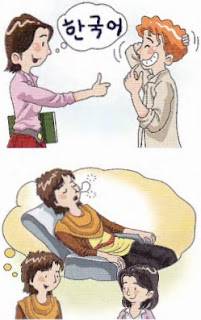가: 한국말을 정말 잘하시네요!
Your Korean is really good!
나: 잘하기는요. 아직도 더 많이 배워야 해요.
No, it’s not really that good. I’ve still got so much more to learn.
가: 어제영화 재미있었어요?
Was the movie interesting yesterday?
나: 재미있기는요. 보다가 졸았어요.
Not really that interesting, I fell asleep watching it.
This expression is used to politely refute or disagree with the other person’s statement. When used in response to a compliment, it expresses the speaker’s modesty. This expression can also be shortened to -긴요.

가: 여러 가지로 도와주셔서 고맙습니다.
Thanks for all you’ve done for me.
나: 고맙기는요. 오히려 제가 도움을 받았는데요.
No need to thank me. You helped me more (than I helped you).
가: 주영 씨는 이제 과장이지요?
Juyeong, you’re now the section head, right?
나: 과장이기는요. 아직도 평사원이에요. 승진하려면 멀었어요.
No. not a section head. I’m still a regular employee. I’ve still got a long way to go before.
가: 주말에 잘 쉬었어요?
Did you rest well over the weekend?
나: 잘 쉬긴요. 조카들이 놀러 와서 정신이 하나도 없었어요.
I hardly rested at all. My nieces and nephews came over, and I was at wit’s end the whole time.
This expression cannot be used together with expressions that denote tense, such as -았/었- and -겠-.
가: 외국에서 살 때 힘들었어요?
나: 힘들었기는요. (X) ->힘들기는요. (〇)
가: 내일 시험이 어렵겠죠?
나: 어렵겠기는요. (X) -> 어렵기는요. (〇)
>> You can click on the title of each grammar below to learn about the other grammar which also expresses ‘Habits and Attitudes’:
01 -곤 하다
02 -기는요
03 -(으)ㄴ/는 척하다
>> Full of Intermediate grammar: Click here

This comment has been removed by the author.
Thanks to the author of this website, I learn a lot from here.
I know you won't reply but, learning korean through my depression has helped me a lot.